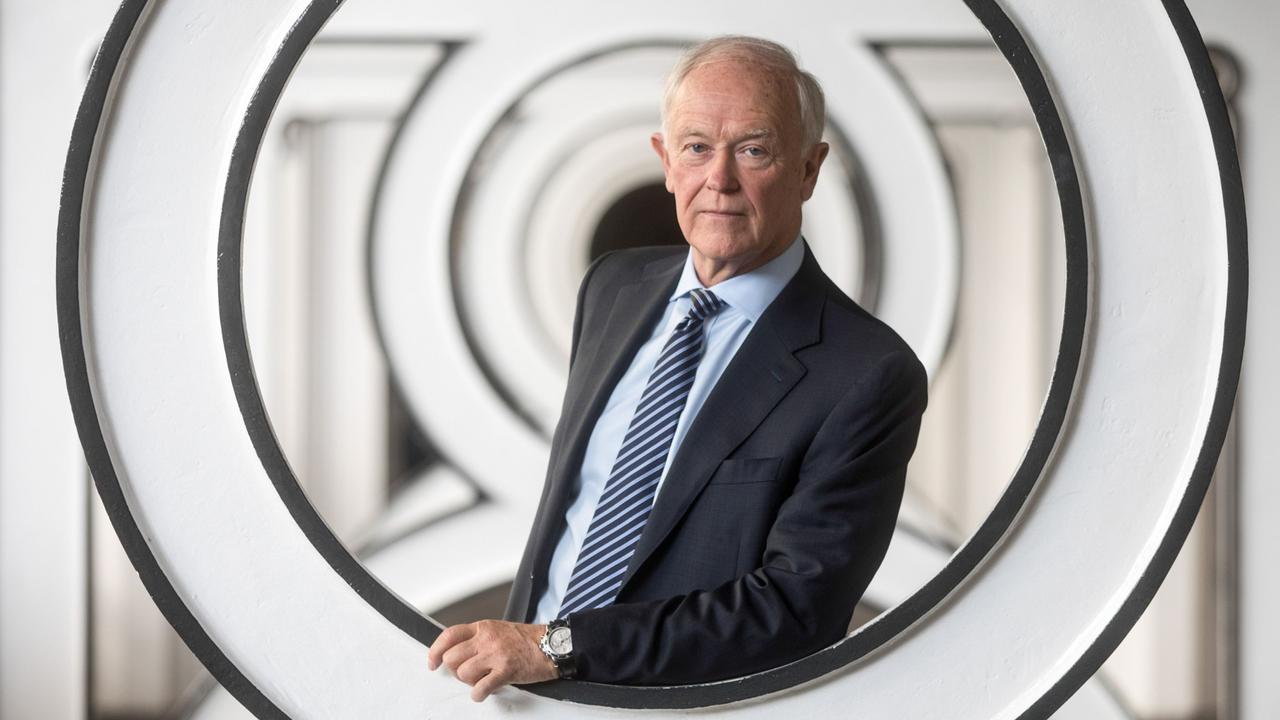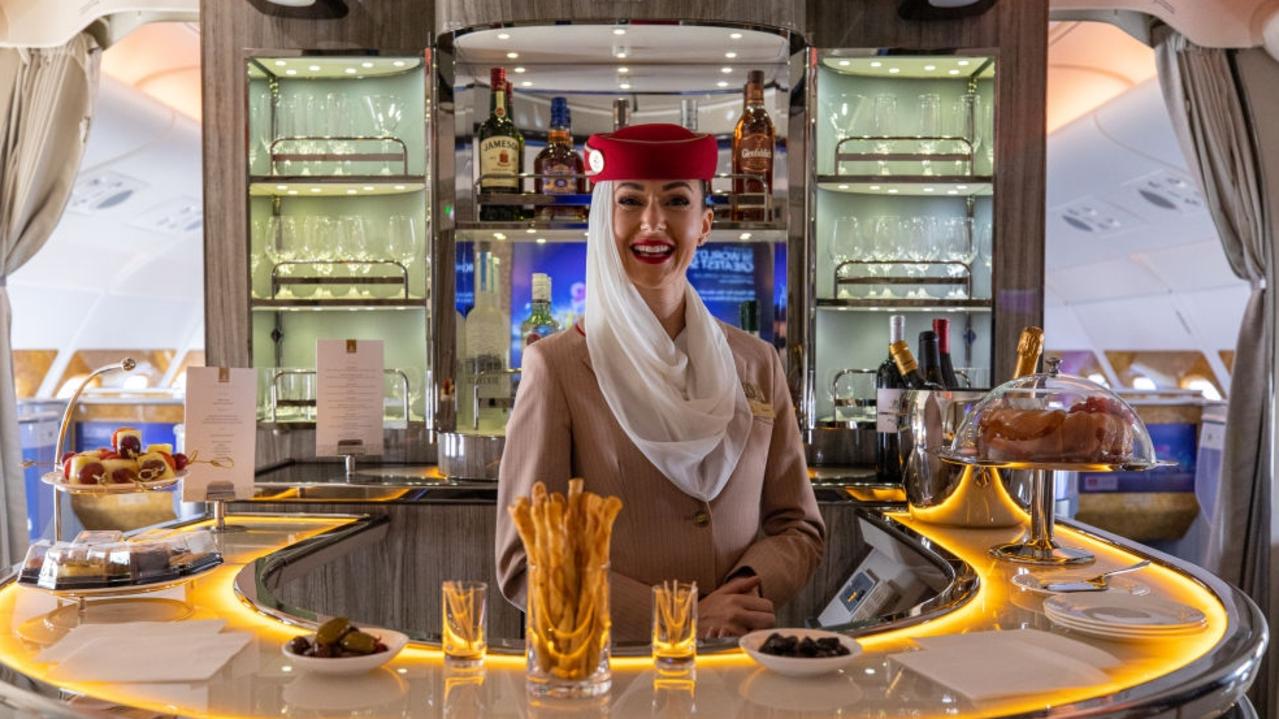Emirates’ president talks A380s, airfares and aeropolitics
The largest operator of A380s, wants an even bigger replacement for the superjumbo, powered by greener technology.
Business
Don't miss out on the headlines from Business. Followed categories will be added to My News.
The largest operator of A380s wants an even bigger aircraft to replace the superjumbo when the aircraft finally disappears from the skies in 10-15 years.
Emirates president Sir Tim Clark ordered more of the double-decker jets than any other airline – 123 in fact – and laments Airbus’s decision to end A380 production, which he blames on airlines that were unable to see the aircraft’s enormous potential.
“There was a degree of what I call aeropolitical envy particularly coming out of the (airline) alliance players in the early 2000s,” says Sir Tim on a rare visit to Australia.
“We are non affiliated, we have done our own thing organically and been very successful in what we’ve done and they blamed the 380 for it. So they were saying ‘let’s gang up, don’t buy any more 380s, that will force it out of production’ and that worked.”
He agrees the A380 has been critical to Emirates’ success as the aircraft most loved by passengers worldwide for its sheer dimensions, spacious interior and smooth ride.
But high fuel costs and the industry’s commitment to being carbon neutral by 2050 meant a replacement aircraft would need to be greener, and just as big or bigger.

“I reckon we could get an A380 in the air redesigned, with the same kind of capacity, for between 20 and 25 per cent less fuel emissions than what it is today,” Sir Tim says.
“To be able to move 500-600 people — that’s the same as 2.5 Boeing 787s going into Heathrow and, with passenger numbers set to double between now and 2035, airports won’t cope with a doubling in aircraft.”
To date, the response from aircraft manufacturers to Sir Tim’s wish has been “no way”, but he is used to that.
He was given the same answer when he asked for ensuites for each first class suite. And when it came to shower rooms in A380s, Emirates was forced to hold clandestine meetings with design engineers after Airbus refused to entertain the idea.
“When we were trying to get the manufacturers to produce aircraft that could fly for 18 hours they said ‘no one’s going to want to sit on an airliner for that length of time’,” he says. “We wanted to be able to fly from Dubai to the east coast of Australia non-stop and it took a lot of arm-wrestling with the heads of the aerospace companies, but the rest is history.
“Everybody trashed us as usual, then up pops the Dreamliner and both Airbus and Boeing realised this is the way to go,” Sir Tim adds.
With flying again taking off, airlines including Emirates have been busy rebuilding their balance sheets, helped by high airfares.

In November, the United Arab Emirates flag-bearer posted a record $1.7bn half-year profit, representing a near $4bn turnaround from the previous corresponding period.
Sir Tim is not convinced the high airfares are here to stay, with economic conditions likely to deliver lower costs throughout the supply chain in the year ahead.
But like other airline operators, he has been pleasantly surprised by passengers’ willingness to pay higher fares, and says if the prices did remain elevated Emirates would reinvest that money in the cabin.
“We might be able to increase the (seat) pitch, increase the width of the seats in economy, do all sorts of things, use the fuselage better for putting some kind of sleeping thing in,” he says.
“Many carriers on the planet would think I’m totally bonkers but I’d like to think with more money we could do more things if I get all the minds on the company together.”
As well as the customer experience, much of Sir Tim’s time is spent pondering what he calls the “most vexing question” facing airlines today – the commitment to be carbon neutral by 2050.
Although he won’t say it’s undoable, it’s clear he is sceptical given the enormous costs involved and the unwillingness of most governments to help.
“The notion we should all be flying on sustainable aviation fuel (SAF) would be astronomically expensive and prices would have to be that much higher to do it,” he says. “The school of thought around (carbon) offsets is beset with multiple problems, from planting trees to carbon credits. It’s hugely difficult and nobody underestimates the complexities of what we’re trying to do.”

The answer then, he says, is green hydrogen and synthetic fuel, using nuclear power to develop them.
“Modular nuclear reactors around the coastlines of Australia or the UK would give you the power to drive the processes to extract green hydrogen. Then you’ve got to refine it,” Sir Tim says.
“It’ll be a technological mountain to get across and we’re going to have to spend trillions and trillions of dollars to get there, and in the process fossil fuels have to be there because we’re not in a position to substitute them completely.”
His airline’s long partnership with Qantas is one of many decisions of which Sir Tim is proud. and he doesn’t hesitate to jump to the defence of the Australian carrier. When asked about the recent spate of turnbacks by Qantas, Sir Tim says any safety-conscious airline would do the same.
“It’s a bit unlucky to have a few in a row, but the airlines you have to worry about are the ones where there’s a fault indicator and they just press on, hoping it’ll all be OK,” he says.
In the short term, Emirates’ focus is rebuilding capacity into its network which has been constrained by staffing shortages in the wake of Covid.
By March the airline will have 63 flights a week into Australia, within striking distance of the 77 weekly flights pre Covid-19.
Returning to Adelaide is a priority, says Sir Tim. and he is also keen to operate to Darwin.
Originally published as Emirates’ president talks A380s, airfares and aeropolitics







